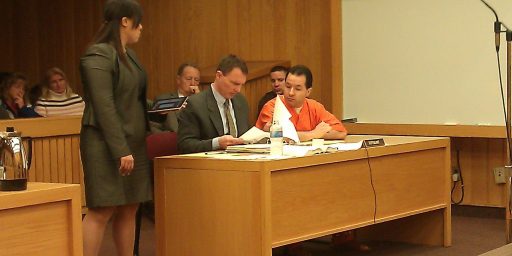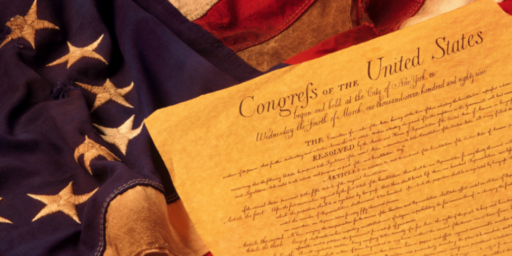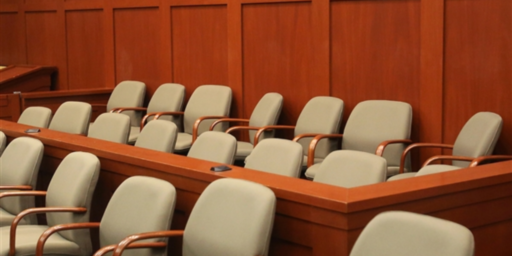Due Process When Everything Is A Crime
Glenn Reynolds has an interesting piece out today in the Columbia Law Review.
Glenn Reynolds has an interesting sidebar piece out today in the Columbia Law Review titled “HAM SANDWICH NATION: DUE PROCESS WHEN EVERYTHING IS A CRIME.”
I joked with him on Twitter, “Some kinda tenured full prof with an endowed chair you are, cranking out law review articles. Yer doing it wrong!” But I didn’t know the half of it: the piece is lucid and completely intelligible to a non-lawyer. Maybe that’s allowed in sidebar pieces but, still, a dangerous precedent for the academy.
That aside, Glenn’s thesis is that, while necessary, prosecutorial discretion is potentially quite dangerous.
Attorney General (and later Supreme Court Justice) Robert Jackson once commented: “If the prosecutor is obliged to choose his cases, it follows he can choose his defendants.”4 This method results in “[t]he most dangerous power of the prosecutor: that he will pick people he thinks he should get, rather than pick cases that need to be prosecuted.”5 Prosecutors could easily fall prey to the temptation of “picking the man, and then searching the law books . . . to pin some offense on him.”6 In short, prosecutors’ discretion to charge—or not to charge—individuals with crimes is a tremendous power, amplified by the large number of laws on the books.
Nor is this merely theoretical:
Overcriminalization has thus left us in a peculiar place: Though people suspected of a crime have extensive due process rights in dealing with the police, and people charged with a crime have even more extensive due process rights in court, the actual decision of whether or not to charge a person with a crime is almost completely unconstrained. Yet, because of overcharging and plea bargains, the decision to prosecute is probably the single most important event in the chain of criminal procedure.
The piece isn’t alarmist, correctly noting that prosecutors tend to be decent sorts and that the incentives are to go after actual bad guys, not fishing expeditions. Still,
[T]hese limitations on prosecutorial power are likely to be least effective where prosecutors act inappropriately because of politics or prejudice. Limited resources or not, a prosecutor who is anxious to go after a political enemy will always find sufficient staff to bring charges, and political constraints are least
effective where a prosecutor is playing to public passions or hysteria.12 Once charged with a crime, defendants are in a tough position. First, they must bear the costs of a defense, assuming they are not indigent. Second, even if they consider themselves entirely innocent, they will face strong pressure to accept a plea bargain—pressure made worse by the modern tendency of prosecutors to overcharge with extensive “kitchen-sink” indictments: Prosecutors count on the fact that when a defendant faces a hundred felony charges, the prospect that a jury might go along with even one of them will be enough to make a plea deal look attractive. Then, of course, there are the reputational damages involved, which may be of greatest importance precisely in cases where political motivations might be in play. Worse, prosecutors have no countervailing incentives not to overcharge. A defendant who makes the wrong choice will wind up in jail; a prosecutor who charges improperly will suffer little, if any, adverse consequence beyond a poor win/loss record. Prosecutors are even absolutely immune from lawsuits over misconduct in their prosecutorial capacity.
The traditional safeguard is the need to secure an indictment from a grand jury. But, the title of the piece points to an old aphorism: “a good prosecutor can persuade a grand jury to indict a ham sandwich.”
So, what then?
Even a shift to qualified, good faith immunity for prosecutors would change the calculus significantly, making subsequent review something that is at least possible. Another remedy might be a “loser pays” rule for criminal defense costs. After all, when a person is charged with a crime, the defense—for which nonindigent defendants bear the cost—is an integral part of the criminal justice process.17 For guilty defendants, one might view this cost as part of the punishment. But for those found not guilty, it looks more like a taking: Spend this money in the public interest to support a public endeavor, or go to jail.
Perhaps the prosecution could be required to pay a defendant’s legal fees if he or she is not convicted. To further discipline the process, one could implement a pro-rate system: Charge a defendant with twenty offenses, but convict on only one, and the prosecution must bear 95% of the defendant’s legal fees. This would certainly discourage overcharging.
And, of course: Charging. People who seem rather obviously guilty seem, especially in high profile cases, to get acquitted with some frequency. Should Chris Darden and Marcia Clark really have had to pay for O.J. Simpson’s team of super lawyers?
The “nuclear option” of prosecutorial accountability would involve banning plea bargains. An understanding that every criminal charge filed would have to be either backed up in open court or ignominiously dropped would significantly reduce the incentive to overcharge. It would also drastically reduce the number of criminal convictions achieved by our justice system. But given that America is a world leader in incarceration, it is fair to suggest that this might be not a bug, but a feature.18 Our criminal justice system, as presently practiced, is basically a plea bargain system with actual trials of guilt or innocence a bit of showy froth floating on top.19
This option is much more appealing. Granted, it means having to take big cases to long, expensive trials that, in many cases, both sides would prefer to avoid. Someone who’s actually guilty of a crime punishable by up to 10 years imprisonment is presumably happy to accept a 2 year sentence and forgo the expense and stress of fighting a losing case–and the prosecutor is likely happy to get the conviction and move on to other cases, especially if it’s a first offense. But Glenn’s right: regardless of how the system is supposed to work, it’s too often abused.
A less dramatic option might be to require that the prosecution’s plea offers be presented to a jury or judge after a conviction, before sentencing. Judges or jurors might then wonder why they are being asked to sentence a defendant to twenty years without parole when the prosecution was willing to settle for five. fifteen years in jail seems a rather stiff punishment for making the state undergo the bother of a trial.
This is a new-to-me idea and I haven’t given it sufficient thought. At first blush, though, it sounds like a good move. A variant of this that occurs to me is to have the two parties plea bargain the sentence ahead of time that will go into effect only upon conviction.
It is also worth considering whether mere regulatory violations—malum prohibitum rather than malum in se—should bear criminal sanctions at all. Traditionally, of course, citizens have been expected to know the law. Yet traditionally, regulatory crimes usually applied only to citizens in specialty occupations, who might be expected to be familiar with applicable regulatory law. Ordinary citizens needed no special knowledge to avoid committing rape, robbery, theft, etc. But now, with the explosion of regulatory law, every citizen is at risk of criminal prosecution for crimes that, as David Gregory’s defenders noted,20 involve no actual harm or ill intent.
This strikes me as a no-brainer on a whole variety of levels. Not only does it go a long way to solving the infamous “Three Felonies a Day” problem but it would instantly change the nature of our system of incarceration. Far, far too many things are punishable by long stints in the pokey.







I agree with the problem identified by Instapundit, but not the remedies, other than the last one. I think trying to reconfigure the rules of court won’t have any of the effects he thinks they will.
There are two groups to blame. First, the legislators for passing so many laws, including criminalization of breaches of regulatory duties without criminal intent (which Glen mentions). Also shorter sentences should be encouraged since there is little deterrent effect at some point.
Second, the judges have the authority to supervise the indictment to avoid excessive charges intended to coerce admitting to a lesser charge. They tend to prefer to wait until after the trial, but this is too late for those who plea out. Also, judges need to use their sentencing discretion in light of the lack of cumulative deterrence mentioned earlier.
Don’t have much to add except astonishment that I generally agree with Mr Reynolds. (I’d thought that the only grounds we shared was our choice of University.) But I would point out that the disparity of power starts much much earlier in the criminal process. A daughter works in law enforcement and from her I’ve learned that one of the most frequest reasons for being tossed in jail is the crime of ‘p*ssing off a cop’.
Since Mr Reynolds background agenda is opposition to a regulatory state, he can safely ignore that.
For everyone who goes on about how the NSA’s universal surveillance isn’t a big concern, _this_ is what they need to be reading. Given the complexity of our legal system – and the bankrupting costs of defending oneself from even a trivial, unfounded charge – when any cop or fed or prosecutor has the ability to pick someone they want to roust & just go “find something” to threaten them with, we’re all screwed.
Date a cop’s ex? Have the “wrong” candidate’s bumper sticker on your car or lawn? Look like someone who beat up the DA in middle school? Sucks to be you – I’ll just sort through all of your web searches and Facebook postings until I find something you did that I can build a charge out of. Then I’ll f*ck you with it until I get bored. And there’s nothing you can do about it, because I’ll make sure it looks like you _actually_ broke a law – even a pointless HOA reg saying you can’t mow your lawn on Tuesday – and never face any consequences myself.
Welcome to the future of law enforcement.
At some point, the Honest Citizen test is going to come up — if we’ve got a legal system where even an Honest Citizen cannot avoid becoming a Felon, doesn’t that mean that the System is Unconstitutional?
So … will we toss the Test or the Problem?
But Legion….how is that different from today???
Ask any black guy driving on the Jersey Turnpike.
Cops have an immense amount of power.
It’s that power that is the problem.
@legion:
As one who got arrested once for pissing off a cop, let me just say that it is a trivial matter to the nth degree. Even “Assaulting a peace officer” is relatively minor.
@OzarkHillbilly: Take note, I mean along the lines of “resisting arrest” (the charges go together) NOT running over a cop, or shooting a cop, or beating one with a baseball bat, etc….
Just that it is a generic charge that gets thrown around a whole lot more than most know of.
For once I am in agreement with Mr Reynolds about the problem. However, I see none of his solutions as being feasible. But here is a thought: How about removing the power to indict from the prosecutor? Make an “Indictor” take it to the Grand jury. An independent “Indictor” would have no influence on the anything after that. An independent prosecutor could look at a sh!tball case given to him by the Indictor and say “Fwck this sh!t.” and dump it on his lowliest ADA. But on the other hand, he could not influence who gets indicted.
Yeah, there are all kinds of flaws with this idea as I have proposed it here, but I am sure that Glen Reynolds, Jack Balkin, Paul Campos, and others could actually flesh it out into a workable project.
ps: And yeah, I recognize that with time, collaboration will happen. But with time, we can counteract it?
@OzarkHillbilly: The problem with the people you’ve mentioned is that no matter how brilliant they may be, I don’t think they have practical legal experience. Reynold’s recommendations don’t impress criminal defense lawyers that work at dirt level. For, example.
If a state’s settlement offer can be used against it after winning a conviction, settlement offers will be higher.
If defendants have to pay the legal costs of a successful prosecution, they will more likely settle out on less favorable terms.
For many defense attorneys, the settlements are the best they can do for their clients.
@OzarkHillbilly: I do like the idea of getting the judiciary more involved.
If I could make just one change to our legal system, it wouldn’t be any of the things that Glenn proposes. It would be that we educate lawyers and judges separately as is the case in some other countries.
Under our present legal system zealous advocacy is considered a high virtue for attorneys. It’s far less useful in judges.
@Dave Schuler:
Agreed, but the problem is arguably worse than that for (“fixing” your last sentence):
@PD Shaw:
Yeah, I was just pulling names out of my ass. If I had said Abigail S****r, people would have said, “Who?” (She was a long time Fed Public defender in E St Louis Fed Court)
@PD Shaw:
Which is where I am coming from.
“Ha, ha, ha! I’ll be here all week. And please don’t forget to tip your waitress.”
While I support the majority of these suggestions, the problem with getting any of this passed is purely political – no legislator wants to face Soft on Crime
(TM)charges from their opponent in the next primary.Thus, we get more and more laws and simplistic “send ’em off to prison and feed ’em Nutraloaf” attitudes.
Until we solve Gerrymandering and money in politics, none of this good stuff will happen.
@Sam Malone:
@OzarkHillbilly:
True. It’s happening now. That’s why ordinary people should be able to see the cliff coming & not just dismiss such concerns. But nothing will change until rich people feel the heat. Want better privacy legislation? Release the Google Search records of a few members of Congress. Want more protections for suspects & defendants? Publicize the sketchy activities of the high-rollers & make it impossible for their sketchiness to be swept under the rug by authorities.
@PD Shaw: There is no such thing as a system that cannot be abused. The key is to build a system that is transparent enough that the gaming is easy to spot & the rules can be adjusted to compensate. The US Constitution is a good example of this. The US legal system finds both of those concepts abhorrent.
If Glenn is opposed to prosecutorial discretion, would he then advocate that we pursue crimes like jaywalking just as vigorously as we do crimes like murder? Assume that you have a police force and DA office with limited resources.
Steve
Can someone convince me that the average person commits an average of three felonies a day? Or one felony per day?
I’ve heard this statement several times but never investigated whether it was true.
@steve:
There’s actually quite a bit of empirical evidence in support of the “broken windows” theory of law enforcement, pioneered IIRC by James Q. Wilson. In vastly oversimplified terms, it suggests that if you prosecute jaywalking you’ll have fewer murders to deal with.
@Tony W:
“Until we solve Gerrymandering and money in politics, none of this good stuff will happen.”
While lots of issues seem to be stuck due to those factors, being tough on criminals does not seem to be one of them to me. To the contrary, this is an issue where the overwhelming majority of the public wants their politicians to be tough on criminals, and no amount of gerrymandering could create districts which support leniency.
It also strikes me as an area where there’s likely less of an interest on the part of the .01% who give money to politicians, but they don’t stand in the way due to it being low on their list of concerns and the overwhelming popularity of these actions among the rest of the public. If they gave money to people who were opposed to these measures, they’d likely just be wasting their donations.
Professor Reynolds doesn’t practice criminal defense law. I doubt that any criminal defense attorneys think that these suggestions would work.
Want to improve the criminal defense system? Decriminalize prostitution and marijuana use (for starters) and put a lot more money and resources into the public defender system.
@Moosebreath: Money works counter to nuance. Without so much money in politics we resort to dry speeches and policy papers to learn about candidate positions. Money helps us overcome political boredom with clever advertisements and slogans. ad nauseam….
@Tony W:
That’s not really responsive to my comment, which was that _this_ issue is one where money plays a large role.